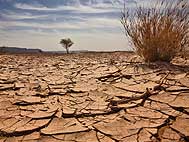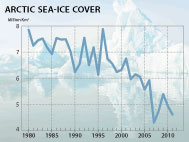| SEARCH |
-

Nov 17, 2015
Reflections on a three-decade legacy
The International Geosphere-Biosphere Programme (IGBP) will come to a close at t...
-
Nov 17, 2015
Use of and access to content on this website
Text and images produced by IGBP in house are free to use with appropriate credi...
-
Nov 12, 2015
Bella Gaia performance and panel discussion to mark IGBP's closure
A musical performance by Bella Gaia will celebrate the achievements and legacy o...
-

Towards Future Earth:
evolution or revolution?
During its three decades of existence, the International Geosphere-Biosphere Pro...
-
A personal note on IGBP and the social sciences
Humans are an integral component of the Earth system as conceptualised by IGBP. João Morais recalls key milestones in IGBP’s engagement with the social sciences and offers some words of advice for Future Earth.
-
IGBP and Earth observation:
a co-evolution
The iconic images of Earth beamed back by the earliest spacecraft helped to galvanise interest in our planet’s environment. The subsequent evolution and development of satellites for Earth observation has been intricately linked with that of IGBP and other global-change research programmes, write Jack Kaye and Cat Downy .
-
Deltas at risk
Around 500 million people worldwide live on deltas, but many of the world's deltas are sinking due ...
-
Climate change: the state of the science
A new data visualization released on the first day of the plenary negotiations at the UNFCCC’s clima...
-
Climate Change:
the State of the Science
Videos now online from the Stockholm public forum to mark the launch of the IPCC's climate report, 2...

The Joint Global Ocean Flux Study
Background for JGOFS Science
In the early eighties, marine geochemists and biologists were concerned that a physical transport model with only an upper boundary condition would be inadequate to determine the role of the ocean in the atmospheric carbon dioxide budget and hence, the prediction of climate change in response to the atmospheric build-up of greenhouse gases would not be possible. Because the oceans contain about 50 times as much CO2 as the atmosphere, small changes in the ocean carbon cycle can have large atmospheric consequences. Both physico-chemical and biological processes influence the exchange of CO2 between the ocean and the atmosphere, with biological feedbacks, in particular, having the potential to amplify the chemical and physical effects. JGOFS was co-sponsored by SCOR
JGOFS Objectives
- To determine and understand on a global scale the processes controlling the time-varying fluxes of carbon and associated biogenic elements in the ocean, and to evaluate the related exchanges with the atmosphere, sea floor and continental boundaries
- To develop a capacity to predict on a global scale the response to anthropogenic perturbations, in particular those related to climate change.
JGOFS improved our knowledge of the processes that control carbon exchanges between the various interfaces as well as the sensitivity of these fluxes to climate change. JGOFS was completed in 2003, the year in which it held its final Open Science Conference in Washington D.C.
The JGOFS International Project Office (IPO) was first hosted by the Institut für Meereskunde, Universität Kiel, Germany (1993-1995) and later by the University of Bergen, Norway (1996-2003) with kind support from the Research Council of Norway, the University of Bergen and the Meltzer Foundation.
JGOFS Legacy
The role of the Ocean Carbon Cycle in Global Change. Fasham, Michael J.R. (Ed.) Springer Verlag, Heidelberg, Germany, 2003, 297 pp. (A synthesis of JGOFS science).
The Changing Ocean Carbon Cycle: A midterm synthesis of the Joint Global Ocean Flux Study. Hanson, R.B., Ducklow, H.W. and Field, J.G. (eds). IGBP Book Series No. 5. Cambridge University Press, UK, 2000, 520 pp.
Ocean Biogeochemistry and global change, 2001. IGBP Science no. 2 (A popular summary of JGOFS main achievements).
For further information about the JGOFS project, and electronic material produced by JGOFS, contact the IGBP Secretariat.
JGOFS website (last updated December 2003)
IGBP closed at the end of 2015. This website is no longer updated.
-

Global Change Magazine No. 84
This final issue of the magazine takes stock of IGBP’s scientific and institutional accomplishments as well as its contributions to policy and capacity building. It features interviews of several past...
-

Global Change Magazine No. 83
This issue features a special section on carbon. You can read about peak greenhouse-gas emissions in China, the mitigation of black carbon emissions and the effect of the 2010-2011 La Niña event on gl...
-
INTERGOVERNMENTAL PANEL ON CLIMATE CHANGE:
How green is my future?
UN panel foresees big growth in renewable energy, but policies will dictate just how big.
-
UK:
'The Anthropocene: a new epoch of geological time?'
Royal Society, Philosphical Transactions A




















